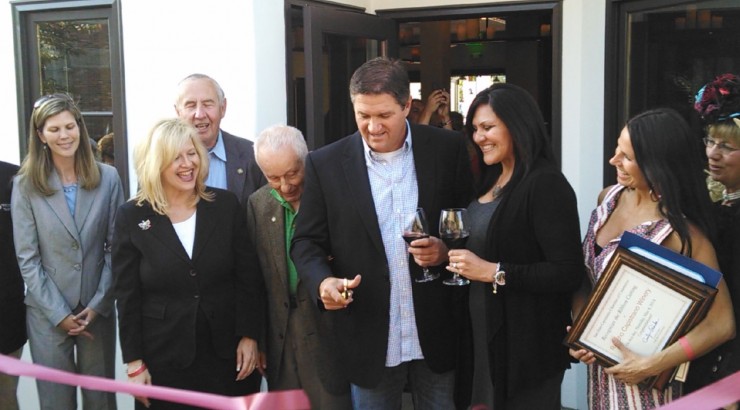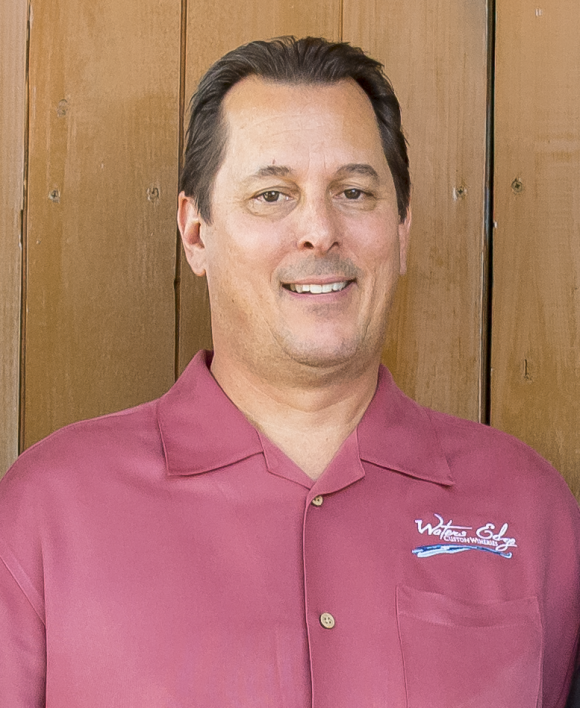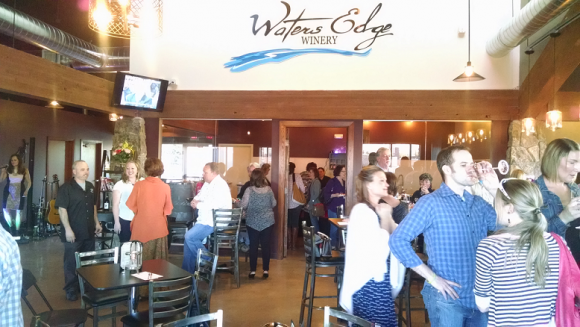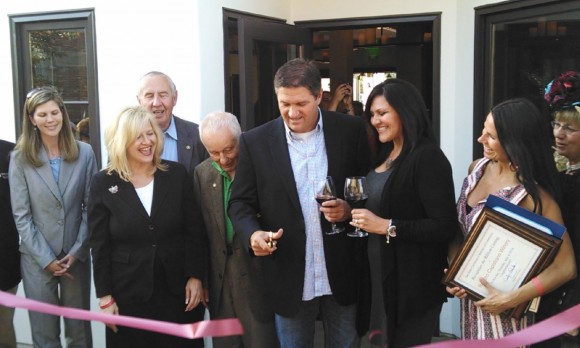Entrepreneur Ken Lineberger ’87 expands winery to 10 locations
June 17, 2015
After 20 years in sales and marketing for the high-tech software industry, Ken Lineberger ’87, along with his wife Angela, opened their first winery in 2004. Ken had envisioned a model that was different from other wineries – there would be no vineyards or farming involved – just winemaking. Their first winery, located in Rancho Cucamonga, has won multiple medals and was voted the best wine-tasting location in the Inland Empire in 2011.
Ken’s vision, now a favorite winery of many wine aficionados and known as
Waters Edge Wineries, Inc.
, has expanded to six locations and will have a total of 10 open locations later this year. He admits that he’s learned a lot along the way and offers his insight to Chapman students in the
Entrepreneur Mentor Program with the Leatherby Center
. Making Chapman proud runs in Lineberger’s family blood: his parents, Norma and Robert Lineberger, were on the list of
150 Faces of Chapman University
and his father served on the Board of Trustees.
Read on to see what inspired Ken’s unique vision and how giving back to Chapman through the Entrepreneur Mentor Program has been one of his most enjoyable experiences.
Tell us about your winery and how your model is different from other wineries. What inspired this idea and how has it seen success?
We began in 2004 in Rancho Cucamonga, Calif., developing the original winery without vineyards concept. We rely on a global supply chain that we have built, and managed to bring in crushed grapes from vineyards in California, Italy, France, New Zealand, Australia, and even faraway places like South Africa and Chile. Once we receive (our supply), we go through the process at each of our locations to turn it into finished wine. We franchise this model, so others can open their own “micro-winery” in their own town. Currently, we have locations in San Juan Capistrano, Yorba Linda, Rancho Cucamonga, Redlands, Oklahoma City and Denver. New locations will be open before the end of the year in San Clemente, Scottsdale, Ohio and Anaheim.
The idea was inspired by the fact that the present model for wineries is a far away location in an agriculture area where people have to travel to visit it. While this is nice if you have the time to go, many people don’t have the time, but crave the winery experience. So we have brought the winery to people by building wineries in urban, populated areas. People are embracing the “buy local” concept and patronizing businesses that make their products locally – and we fit perfectly in this new paradigm. We succeed because we bring that winery experience to people in a more accessible, and often more affordable, way.
What prompted the transition from your involvement in the software industry to winemaking?
I saw this opportunity that was not being leveraged and felt that if we could create systems and documentation around this concept, we could replicate it – bringing the dream of owning your own winery out of the realm of the mutli-millionaires and into an affordable business model for other entrepreneurs. It was an opportunity that I could not ignore! So goodbye software sales world, hello wine! It’s been great, and while we’ve certainly had our share of bumps along the road, after 11 years we have achieved successful, steady growth.
How did your experience at Chapman guide you in your professional life?
Chapman taught me to think independently, to not just follow what others are doing. In fact, I hate following the crowds or doing the “in thing.” I’m a very independent person – a characteristic that Chapman helped give me the confidence to embrace.
What role does your winery business background play in your experience with the Entrepreneur Mentor Program?
This has been one of the most enjoyable experiences as I’ve matured in my business knowledge and experience. The students are all inspirational and really impress me with their vision, strength of ideas, and determination to be successful. While not every idea will be a winner, their thought process and learning experience will make them winners over the long haul. My experience has allowed me to view their ideas through a lens of reality. Many people have great ideas, but when they try to match those ideas up with a profitable business model, they struggle. If they actually make their idea into a business, but have not tied the idea with a profitable model, they will ultimately fail. The only question is how long it takes based upon their startup capital. That’s the most important lesson I’ve learned in owning my own business that I can share and help other entrepreneurs with.
Explore and Connect Further:
-
Want to be featured in a blog like this, on social media or in Chapman Magazine? Share your news with us »
-
Want to catch up with alumni friends? Attend our next event »
-
Want to get involved with your alma mater? Volunteer with us or join an alumni group »
-
Who doesn’t like a good deal? Check out your alumni benefits and discounts »
-
Want to receive the monthly alumni e-newsletter and stay connected with Chapman? Make sure we have your current contact info »



